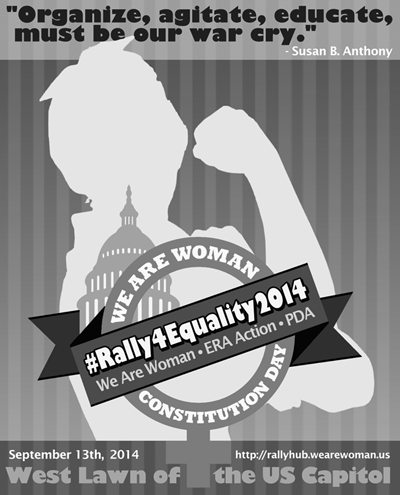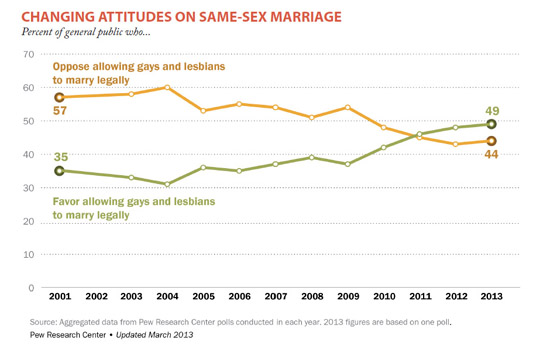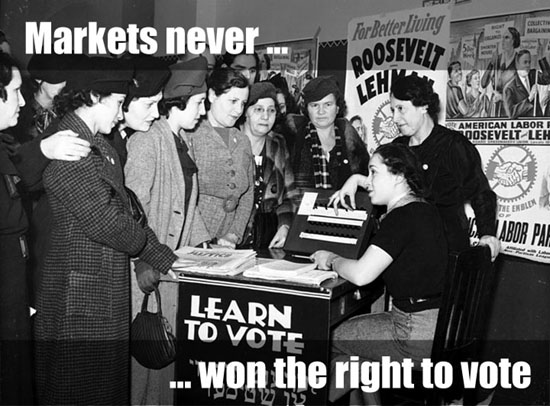#Rally4Equality: If we care about equality, we should care about democracy
Some friends of mine are helping to put together the #Rally4Equality next week in Washington, D.C.
They asked me if I’d ever written anything about equality. I’ve written about economic equality, I said.
To be quite honest, the idea scared the crap out of me.
Why? I typically write about economics and framing. What could I say about women’s rights that hasn’t been said by several generations of women activists and suffragist leaders?
Of course I was also intrigued. What could I say?
So I told them I’d think about it.
One question that kept coming up: How would I explain women’s rights and equality to my conservative friends? Could I even talk about this issue with conservatives? Could I convince conservatives that equality was an issue worth fighting for?
Below are my early attempts and what I learned.
Target and goal
Before having any conversation like this, I always spend a little time thinking about my target and goal. Who do I want to talk with and what am I hoping to accomplish?
This is a conversation I would only have with someone I have a relationship with. When I say “relationship,” I don’t mean intimate relationship but someone I know who is at least a casual acquaintance. A friend or family member would be even better.
My goal was to convince them of the importance of equality. My goal was not to win an argument, but to win someone over so that they would either fight alongside us or, at the very least, recognize the importance of equality.
So far, I’ve had a version of this conversation with 4 people. You have to start somewhere.
The importance of public opinion
Since the 1980s, the LGBT movement has shifted public opinion on same-sex marriage.
This didn’t happen magically. They did this by coming out of the closet and talking to people about it. They did it by making “marriage equality” a moral issue.
Once you know someone who is gay and you can see that not being able to marry is denying them a basic right, most people support equality.
The LGBT movement accomplished this through both a mass media effort and an appeal to gay people to share their stories. Here, I’m going to talk more about the latter.
Please keep in mind that mass media strategies are very different from personal conversations. In personal conversations, remember that your relationship is most important. You don’t want conversations to turn into confrontations. If they do, you lose the relationship and any chance at winning the person over.
Towards this end, also remember that facts never won anyone over outside of perhaps a few settings such as academia. The LGBT movement accomplished their shift by coming out of the closet and sharing their stories.
Where to start?
The first place to start is to understand what the target audience believes. In order to win someone over, you first have to understand where they are at. You first have to understand their beliefs. Not your own.
What do conservatives believe about equality?
Some of the things I’ve heard:
• We’ve done enough to create equality
• Individuals should be judged based on their ability and not their race or gender
• Government shouldn’t be involved in solving problems of equality
• Everyone already has equal opportunity
• Feminism is about assigning blame
• We should appreciate the differences between men and women
• Equality is a political maneuver to pander to a certain voting bloc
• If someone has the desire, they succeed at whatever they want
Interestingly enough, most of the personal conversations I’ve had with conservatives about equality were about affirmative action. Conservatives seem most strongly against affirmative action programs on the basis that it is government interference.
For the most part, the conservatives I know don’t talk about women’s rights or, if the issue comes up, they tend to think that equality has been established by the 19th Amendment to the Constitution and nothing more needs to be done. The 19th Amendment ensured women the right to vote.
Some quotes from conservatives about equality:
“The arguments I see regarding equality don’t seem to be ‘Treat me equal’ but more ‘Everything must be 50/50’. Treating someone equally means having criteria and holding everyone, regardless of sex, to the same standard. Being 50/50 means having different criteria to meet the goal of 50% male and 50% female.” – Laura K. Fillault, Redstate
“Equality is an artificial construct… there is no such thing in nature… everything has its own advantages/disadvantages as a result of its nature and nurture… my belief is that you try to eliminate roadblocks to anyone being able to achieve what their nature allows… but the equality infrastructure is mostly a political device to pander to some voting block.” Cubeless, Anandtech Forum
“Of the hundreds of arguments I’ve had only a few have kept their cool and only a handful have really made me work hard to win an argument, but I do and everyone reading the thread get’s to see another angry irrational feminist slinging insults. I take that as a victory and if it convinces just one person that feminist’s anger is a sign of their lack of emotional control and ergo, lack of critical thinking, then I sleep well at night.” – Free Human Being, A Voice for Men
“But there are enough examples of people coming from terrible backgrounds to prove if someone has the desire they succeed at whatever they want.” – blackangst1, Anandtech Forum
Setting aside my anger (and yeah, I know it can be hard as some of these statements are deliberately provocative), what are the beliefs at the heart of these arguments?
The main belief is personal responsibility. It is the belief that the individual and the individual alone determines whether they succeed or fail.
You may agree or disagree with this belief. If, however, you hope to help people see beyond this belief you must first acknowledge the belief.
You stand a much greater chance of reaching someone if you are able to start from a position you both share. This is why it’s so important to understand beliefs.
What do I believe?
I also believe in personal responsibility. Since this is an area of commonality, it’s a great starting point for a conversation.
I started my conversations by bringing up the #Rally4Equality and talking about my own struggle to understand a movement outside my own personal experience.
I started with:
If I had a daughter, I would want my daughter to be responsible. I’d want her to be tough and able as any man to survive on her own. I’d want her to make good decisions and I’d want her to understand the importance of being responsible to herself and to others.
Remember, this is a conversation. It’s not a monologue. Ask how your friend or relative feels. Ask what they believe.
Do not lie. If you don’t believe in personal responsibility, don’t say you do. I have no problem talking about personal responsibility with conservatives (or anyone for that matter) because I believe it. Most liberals I know do too.
I simply believe some other things as well. For instance, I also believe in equality. I think many conservatives do too. I simply chose not to start here because I wanted to establish that we’re on the same side. This should not be a conversation between enemies.
It is not personal responsibility vs. equality.
I’m not going to play the right/left game. I’m someone talking about a belief I hold that is the same as their belief.
I found that it’s easy to start the equality discussion at personal responsibility.
There is a problem
Once you’ve established common ground you can take things a step further. One of the best ways to do this is to point out a problem. Especially if you can point out the problem through personal experience.
Here, I asked the question: What happens when some of the men out there aren’t acting very responsibly? In particular, when many of these men are in positions of power.
Let’s say your daughter does all the right things and something still happens. What should happen?
When I taught creative writing during my graduate school days, each quarter, almost without fail someone would submit a rape essay. I was fortunate in that I never personally had one submitted to me. But I know other teachers who did. And you can find similar examples online. One that breaks my heart was posted recently at Duke.
An excerpt from the essay titled “Nothing There” reads:
For the one hour that I show it-for the hour that I need help-I search frantically, but there’s nothing there. Once I release the tension of acting normal, the memories of it flood back, wave after wave, and I can barely make the walk to my bed. It’s a movie on repeat that makes my stomach twist up, sucks the air out of the room, and makes both silence and crowds equally unbearable. It’s the reason why I look so scared when you shout my name across the quad, or stand behind me and tap my shoulder. …
You promised yourself after it happened that you’d never feel that way again, but so it goes…They can’t help you, and frankly, they don’t understand why you’re so upset. It happened almost two weeks ago. You’re sending them mixed messages; why would you be in class if you’re in so much pain? There’s nothing there, and you’re exactly back where you started: shaking and crying and completely alone.
This is the story of a girl who did everything right. Duke has very high standards for admission and she’s cleared the bar.
Yet something happened to her anyways. Something she can’t even name.
And she’s the one who feels alone. She’s reaching out trying to find help and is getting asked questions like: “Why would you be in class if you’re in so much pain?” She’s the one who is being told: “There’s nothing we can do to help you.”
1 in 5 women in the United States has experienced rape or an attempted rape.
What should we do when women do all the right things and men are not responsible?
I believe we need to hold these men accountable just as we would hold any other type of irresponsible criminal responsible.
In the process of telling this story from my experience, I asked, have you ever experienced anything similar?
One friend of mine talked about the (mostly male) surgeons at a local hospital where she worked. Many doctors were very respectful. But a couple of doctors were notorious for abusing their power by treating the mostly female nursing staff like shit. These doctors could not make mistakes, it was always the fault of the nurse or a surgical technician.
As we talked, I thought, “Wow, she really gets it.”
We can do something about it
At this point in one of my conversations, the question came up: What can we do about it?
The fact that I was asked the question is great. It means someone is transitioning from “This is a problem” to “What can we do about it?”
One of the most frequent mistakes I think people make when talking with their friends is focusing too early on solutions. We tend to want to get to our solution. Maybe because we’re passionate and we’ve already established the problem in our minds.
I’ve found that we should talk about solutions only at the point when we’ve agreed on the problem.
There’s also a couple of different tones in which this question can be asked. If the emphasis is on “what” (“What can we do about it?”) the person really wants to focus on solutions. If the emphasis is on “we” (“What can we do about it?”) you may find that the person doesn’t think anything can be done.
In this particular conversation, I didn’t think she felt like she could make a difference.
I told her that the little things people do add up to a huge difference. This is how movements win. This is how the marriage equality movement is winning.
The first little thing you can do is vote.
And almost as important, you can let your representative know why you are voting for them. It’s not enough simply to vote. You need to tell your representative you are voting for them because of their position on equality.
If they do not have a position on equality, you should encourage them to support equality. If you did nothing else, just taking these steps is huge.
You can also:
- Join an organization working to make things better such as We Are Woman, the National Organization for Women, and URGE (Unite for Reproductive and Gender Equity).
- Support the ratification of the Equal Rights Amendment (many people think this already made it into the Constitution) and other strong legislation supporting equality and equal pay. If we don’t put these changes in our most important documents and call them rights, then Justices like Antonin Scalia believe it is Constitutionally acceptable to pass laws that discriminate.
- Tell your story. What are your experiences with equality? Remember, the marriage equality movement is succeeding because people talked about marriage equality and made it an issue. It did not succeed because of facts. Tell your story to the people you know. Write a letter to the editor. Talk about it as much as you can and talk about it respectfully.
- Attend events like the #Rally4Equality2014 on September 13th. Blatant promotional plug :).
The more people speak out, the more other people will speak out. I know it feels slow and painful and sometimes frustrating, but this is how change happens. Pressure has to build in order to force politicians and government to act.
What about “big government”?
When talking with conservatives (even independents and some democrats), you will likely encounter opposition to government solutions of any kind.
Most conservatives I talk with are with me up until the point that I start talking about what we, the people, can do to make our lives better and govern ourselves. Corporate special interest groups have worked very hard over the years to fight against “we, the people” governing ourselves. The more they weaken government by and for the people, the more powerful they become.
Towards this end, many corporate special interest groups promote philosophies of helplessness. A few examples include:
• “Let the markets work.”
• “Less government”
• “Interference is socialism”
These philosophies say “trust us”. You don’t need to do anything else but trust us. When 1 in 5 women face rape, I don’t believe trust is working.
Because we know that power corrupts, it’s not enough to “trust.” We must also verify and act. We don’t “trust” that people won’t murder someone. We have strong laws in place and enforcement in place. We don’t tell the victims they should have been more careful not to get murdered. Similarly, we need checks and balances in place to ensure equal treatment and equal pay for equal work.
Strong laws and even constitutional amendments such as the Equal Rights Amendment allow the responsible to come forward and tell the truth without fear of repercussion. Laws make sure people in positions of power don’t abuse that power.
A phrase Reagan often used (stolen from a Russian proverb) was “Trust, but verify.”
Basically, when trust isn’t working we need to take action. In order to take action, we need good laws in order to hold people accountable.
Markets never fixed issues of inequality. People fixed them.
People had to fight to end slavery. People had to fight to get women the right to vote. People are still fighting to end racism. People are still fighting to end poverty. People are still fighting to end violence. People are still fighting for equality.
We started as a nation where only “men” were created equal, but we’ve worked steadily to change.
In a democracy, people create change.
What about incentives?
Inevitably when talking about equality with conservatives, you will face the economic argument that incentives matter. If everyone is treated equally, there will be no incentive to become a doctor, or a lawyer, or a billionaire.
I also believe incentives matter. However, I believe in fair incentives.
This argument actually works in favor of equality. Shouldn’t incentives for men and women be equal?
An even better way to ask this would be, why should incentives for men and women be different if the job is the same?
Helping people come to their own conclusions is much more effective than telling them your point of view.
What I learned
Having this conversation really wasn’t as hard as I thought when I spoke from my personal experience.
A few other thoughts:
- If you start from a point of commonality, you stand a much better chance of being able to work together to solve a problem.
- Before you start talking about solutions, you have to establish the problem. This wasn’t as hard as I thought with the people I spoke with.
- Conservatives also believe in fairness and equality.
- The biggest issue I found were the corporate special interest group frames against government solutions. The conservatives I spoke with were more opposed to government solutions of any kind than they were to equality or fairness.
If you can reframe government as democracy (by and for the people) and break people out of “size of government” thinking, equality laws are much easier to talk about.
My biggest takeaway from this exercise was, if you’re going to talk with conservatives about the importance of equality, be ready to have a story about our laws and government coming from the people.
Has anyone else tried this? If so, what worked (and/or what didn’t)?

Patrick Stewart: “I am doing this for my Mother who earned 3 pounds 10 shillings for working a forty hour week in a weaving shed.”













